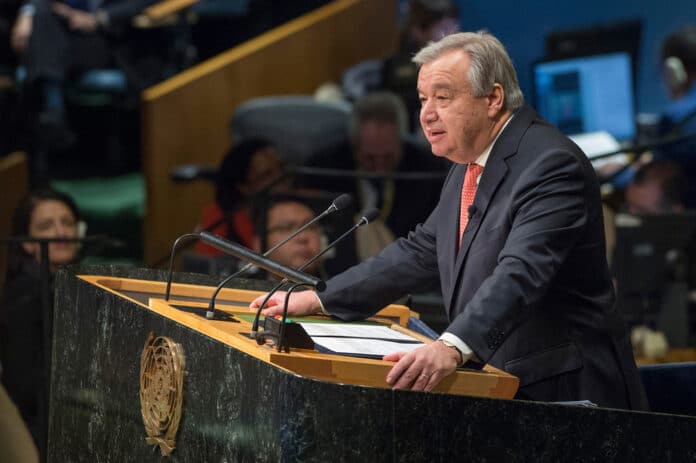Secretary-General’s message to the United Nations Global Congress of Victims of Terrorism
[as delivered by the Deputy Secretary-General on behalf of the Secretary-General]
8 September 2022
President of the General Assembly of the United Nations, His Excellency Abdulla Shahid,
Excellencies,
Distinguished delegates,
Dear friends, and of course the survivors that are with us here and outside of this hall.
Welcome to the first United Nations Global Congress of Victims of Terrorism and thank you to USG Voronkov and his team for helping us to get to this space and provide the opportunity for all these inputs.
Before proceeding, I would like to call on everyone here to observe a moment of silence in honour of victims of terrorism across the globe: those who have been injured, those who have been lost, and those whose lives have been permanently altered as a result of terrorist acts.
[Pause for a moment of silence]
Thank you. Excellencies, I will be delivering these remarks on behalf of the Secretary-General, who is currently travelling in Pakistan in solidarity with horrendous climate events that happened last week.
This Congress is an event for victims, with victims, and by victims – the people and communities who suffer the direct consequences of terrorism around the world.
Your courage and resilience are an inspiring example.
Solidarity and support for victims of terrorism is a moral obligation and a humanitarian and human rights imperative.
But let’s be clear: today’s Congress is not only to benefit victims.
It is an essential part of our efforts to prevent and end terrorism everywhere.
Amplifying the voices and views of victims and survivors is the ultimate demonstration that the terrorists will never prevail.
And victims and survivors bring unique knowledge and new approaches to inform counter-terrorism policies on the ground.
You help bring perpetrators to justice.
Your voices combat extremist narratives.
Today’s Congress is an occasion to stand with you and recognize your experiences and your invaluable contributions.
Terrorism exacerbates poverty, political and economic instability, and climate change.
It affects people of all ages and genders and from all cultures, religions, and nationalities.
It is a direct threat to international peace and security. It impedes sustainable development and undermines human rights and the rule of law.
It is frequently marked by sexual and gender-based violence and deepens gender inequality.
And terrorism combines with other global crises, from climate change to the COVID-19 pandemic, to further marginalize vulnerable groups.
For all these reasons, the United Nations is stepping up efforts to combat terrorism in all its forms.
We have made significant progress. The International Day of Remembrance of and Tribute to the Victims of Terrorism was established in 2017.
Two years later, the General Assembly adopted a resolution calling on Member States to better support victims of terrorism.
Today’s Congress is a further sign of our unwavering support, and an opportunity for progress on three fronts:
First, recognition of victims and solidarity with them.
The unique needs of victims must be acknowledged through the granting of legal status. Their needs should be supported through comprehensive, gender-sensitive services.
Second, victims need accountability and access to justice.
Accountability is key to healing and rehabilitation.
This includes the recognition of the specific needs of women and girl victims, who may face challenges accessing justice due to underlying gender stereotypes.
I urge all parties to respond to victims’ calls for transparency and information-sharing during the investigation of terrorist attacks.
Third, this Congress is a clarion call to keep victims front and centre in all our counter-terrorism work.
I encourage Member States to use this opportunity to recommit to promoting victims’ rights and supporting their needs – financial, legal, medical, and psychosocial.
I call for a particular focus on the provision of mental health and psychosocial support services to victims and their communities, for as long as necessary.
I would like to send a specific message to victims themselves:
Your voices matter.
We will continue to listen to you and to tell you: you are not alone.
Sharing your testimony can bring up painful memories. But it helps to raise awareness of the impact of terrorism – and our duty to eradicate it.
We learn from you, draw inspiration, and strengthen our resolve to tackle the root causes of terrorism and prevent future attacks.
This Congress is a reaffirmation of our commitment to action.
And together, we can and will defeat terrorism.
Excellencies, ladies and gentlemen this ends the remarks of the Secretary-General.
But if you will allow me in my own contribution to this important issue. As a young person I grew up and went to school in Maiduguri, in the north-east of Nigeria. It was a flourishing part of our country economically and socially. However sadly today it is known as the birthplace of Boko Haram, the good news is we have been able to overcome most of this in our State. Today we are reintegrating members of Boko Haram, we are also providing support as we can on psychosocial to our women. So, there is hope even though we must do so much more.
But let’s remember no one is born a terrorist, conditions are there that allow this to happen and what we really have to address are those root causes. So that we can see and end terrorism in the names of all those we have lost, but especially for those who have survived.
Thank you.

